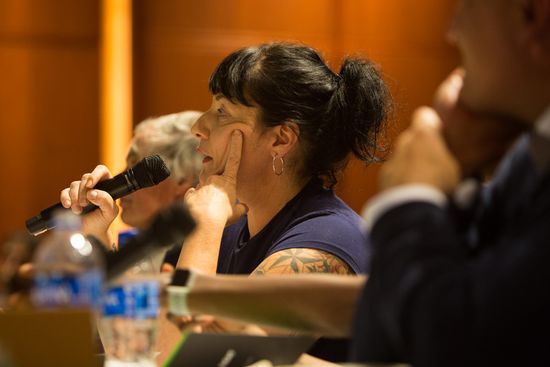A Job Website Wins Big at BU Cannabis Start-up Competition
Innovate@BU awards $10K to freelance services marketplace for the industry

Taylor Aldredge (COM’10) (left) and Denise Biderman won the competition with their pitch for the Mary’s List freelance cannabis industry job site.
An online job site for the cannabis industry called Mary’s List won $10,000 on Wednesday in the second annual Innovate@BU Cannabis Start-up Competition, just as legal recreational marijuana sales appear set to begin in Massachusetts.
“It’s really surreal to be here,” said Taylor Aldredge (COM’10), who cofounded Mary’s List with Denise Biderman. “When I was in college, we were talking about decriminalization as an issue. To now be winning a startup competition for a company that operates in the cannabis industry is awesome.”
They pitched Mary’s List (think Angie’s List, specifically for cannabis work) to the four judges as a “freelance services marketplace for the cannabis industry,” a job board bringing together businesses who need work done and freelancers with skills in anything from botany to marketing.
The contest was sponsored by the Denver-based cannabis business strategy firm Green Lion Partners, operated by Jeff Zucker (Questrom’10) and Mike Bologna (Questrom’10). “It’s a good time for the cannabis industry right now,” Zucker said. “We are making a lot of good, positive changes.”
The contest was for BU student or alumni “ancillary businesses”—those that don’t actually grow or sell weed. The five teams competing offered varying statistics on the industry’s potential, but agreed it will manifest hundreds of thousands of new jobs and billions in revenue in just a few years, and right now Massachusetts is a sweet spot for those opportunities. Nationwide, 10 states have legalized recreational marijuana, with Michigan the latest to act this Tuesday.
“The need for innovation in this industry is huge, so I’m here looking for some investment opportunities,” said judge and industry veteran Jaime Lewis, a managing partner of Coldwater Consulting and former COO of a large Colorado dispensary.

While recreational and medical use are legal in Massachusetts, marijuana is still illegal on campus because federal law prohibits it, and colleges that receive federal money must uphold that law or risk losing their funding. Cannabis advocates at the Innovate@BU competition, held at the Questrom School of Business, noted continuing positive signs for the industry, though, including election-night wins for cannabis in several states Tuesday and the exit of diehard pot foe Jeff Sessions as US attorney general on Wednesday.
Still, erasing the stigma around cannabis was a recurring theme in the competition, and one otherwise lauded start-up ran afoul of the judges on that issue.
Deepti Venkatraman (CGS’13, Sargent’15) and Leslie McAhren are the founders of Soberizer, hoping to market an inhaled spray that “sobers high people up” using an already known chemical that blocks cannabinoid receptors in the nervous system, shutting off the effects of THC, marijuana’s main psychoactive component. The creators tout its value especially in avoiding impaired driving by recreational pot users, a big issue in legalization. They wanted the $10,000 to move toward a major test of the substance for this off-label use, a required first step to FDA approval. And the judges liked the concept.
Soberizer would be useful in situations like, “‘Hey, I took a 50-milligram edible and I’m freaking out,’” said judge Andrew Thut, CIO of the cannabis-industry investment firm 4Front Ventures. It could be sold at dispensaries right alongside the cannabis and become a game-changer, judges said.
Venkatraman and McAhren met at Johns Hopkins Bloomberg School of Public Health, where both earned a master’s degree this year, and Soberizer was inspired by Narcan, a Naloxone spray being used with much success to treat opioid overdoses. But their decision to open their contest presentation with facts and slides centered around the opioid epidemic turned off the judges, as comparisons to hard-drug addiction don’t exactly contribute to the mainstream acceptance of cannabis.
“Get rid of the Narcan (expletive),” Lewis said, getting the night’s biggest laugh. “It’s driving me crazy.”

Humor aside, it was a serious concern for her, Thut, and the other two judges, Kim Napoli, a Massachusetts attorney and cofounder of Cambridge’s The Hempist store, and Peter Bleyleben, a partner in Converge Venture Partners, the only judge without cannabis experience and the only one who wasn’t part of last year’s contest. Another presenter was praised afterward for starting to say “marijuana” in his presentation, before catching himself and switching to the industry-preferred “cannabis.”
The other three start-ups to present were:
- Green Spice, founded by Juan Gallegos (CAS’21) and Erinique Owens, which wants to make “millennial women feel serene with their cannabis experience” with a phone app and meal kit delivery service. One judge likened Green Spice to the popular HelloFresh. The cannabis content will be provided, likely in cooking oil, by a separate vendor. The judges liked this idea, especially after they heard its aim is in microdosing, which should mean fewer regulatory hurdles.
- Highly, founded by William Belt (CGS’14, COM’16), another digital networking service for cannabis professionals, which aims to bring entrepreneurs together with investors trying to find their way in the industry and provides info on best practices. Belt also pitched a strong interest in involving members of minority communities who have been disproportionately affected by the war on drugs.
- PuffSpot, founded by Ben Reichelt (CGS’19), a service bringing a “safe, private and legal” mobile cannabis consumption area to private events and commercial venues on demand in the form of a customized van or bus. This is intended as a solution for places like Massachusetts, where legal recreational cannabis cannot legally be consumed in public. The judges were enthusiastic about the proposal, especially since Reichelt has already retained counsel to advise on the legal issues, although they had questions about security and “Where does the driver go?”
The evening began with remarks from conference organizer Ian Mashiter, a Questrom School of Business senior lecturer and managing director of the BUildLab: IDG Capital Student Innovation Center, and representatives of the Marijuana Policy Project and the Boston chapter of Students for Sensible Drug Policy.
Attendees also heard from Marion McNabb (SPH’16), cofounder of the Cannabis Community Care and Research Network, an online hub for cannabis experts, researchers, and policymakers, which was last year’s contest winner. She said that in the last year, the C3RN, as it’s known, has accumulated 2,000 members, held six major events in Massachusetts, and undertaken a joint research project with the University of Massachusetts Dartmouth. “We’ve done what we set out to do,” she said.

Comments & Discussion
Boston University moderates comments to facilitate an informed, substantive, civil conversation. Abusive, profane, self-promotional, misleading, incoherent or off-topic comments will be rejected. Moderators are staffed during regular business hours (EST) and can only accept comments written in English. Statistics or facts must include a citation or a link to the citation.